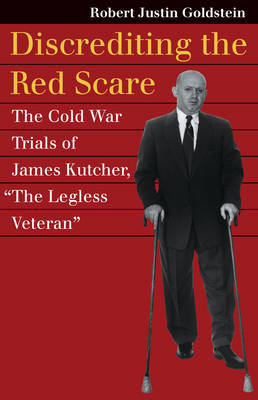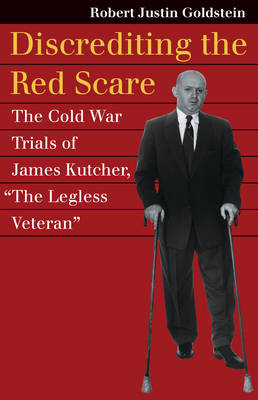
Nos liseuses Vivlio rencontrent actuellement des problèmes de synchronisation. Nous faisons tout notre possible pour résoudre ce problème le plus rapidement possible. Toutes nos excuses pour la gêne occasionnée !
- Retrait gratuit dans votre magasin Club
- 7.000.000 titres dans notre catalogue
- Payer en toute sécurité
- Toujours un magasin près de chez vous
Nos liseuses Vivlio rencontrent actuellement des problèmes de synchronisation. Nous faisons tout notre possible pour résoudre ce problème le plus rapidement possible. Toutes nos excuses pour la gêne occasionnée !
- Retrait gratuit dans votre magasin Club
- 7.000.0000 titres dans notre catalogue
- Payer en toute sécurité
- Toujours un magasin près de chez vous
Discrediting the Red Scare
The Cold War Trials of James Kutcher, the Legless Veteran
Robert Justin Goldstein
118,95 €
+ 237 points
Format
Description
During the Allies' invasion of Italy in the thick of World War II, American soldier James Kutcher was hit by a German mortar shell and lost both of his legs. Back home, rehabilitated and given a job at the Veterans' Administration, he was soon to learn that his battles were far from over. In 1948, in the throes of the post-war Red Scare, the hysteria over perceived Communist threats that marked the Cold War, the government moved to fire Kutcher because of his membership in a small, left-wing group that had once espoused revolutionary sentiments. Kutcher's eight-year legal odyssey to clear his name and assert his First Amendment rights, described in full for the first time in this book, is at once a cautionary tale in a new period of patriotic one-upmanship, and a story of tenacious patriotism in its own right. The son of Russian immigrants, James Kutcher came of age during the Great Depression. Robbed of his hope of attending college or finding work of any kind, he joined the Socialist Workers Party, left-wing and strongly anti-Soviet, in his hometown of Newark. When his membership in the SWP came back to haunt him at the height of the Red Scare, Kutcher took up the fight against efforts to punish people for their thoughts, ideas, speech, and associations. As a man who had fought for his country and paid a great price, had never done anything that could be construed as treasonous, held a low level clerical position utterly unconnected with national security, and was the sole support of his elderly parents, Kutcher cut an especially sympathetic figure in the drama of Cold War witch-hunts. In a series of confrontations, in what were highly publicized as the "case of the legless veteran," the federal government tried to oust Kutcher from his menial Veterans' Administration job, take away his World War II disability benefits, and to oust him and his family from their federally subsidized housing. Discrediting the Red Scare tells the story of his long legal struggle in the face of government persecution--that redoubled after every setback until the bitter end.
Spécifications
Parties prenantes
- Auteur(s) :
- Editeur:
Contenu
- Nombre de pages :
- 224
- Langue:
- Anglais
- Collection :
Caractéristiques
- EAN:
- 9780700622245
- Date de parution :
- 01-04-16
- Format:
- Livre relié
- Format numérique:
- Genaaid
- Dimensions :
- 157 mm x 234 mm
- Poids :
- 521 g







